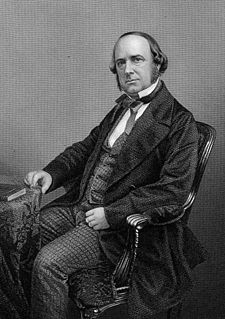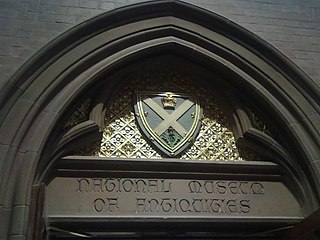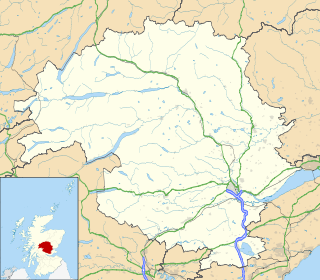
An antiquarian or antiquary is an aficionado or student of antiquities or things of the past. More specifically, the term is used for those who study history with particular attention to ancient artifacts, archaeological and historic sites, or historic archives and manuscripts. The essence of antiquarianism is a focus on the empirical evidence of the past, and is perhaps best encapsulated in the motto adopted by the 18th-century antiquary Sir Richard Colt Hoare, "We speak from facts, not theory."

Thomas Wright was an English antiquarian and writer.

John Nichols was an English printer, author and antiquary. He is remembered as an influential editor of the Gentleman's Magazine for nearly 40 years; author of a monumental county history of Leicestershire; author of two compendia of biographical material relating to his literary contemporaries; and as one of the agents behind the first complete publication of Domesday Book in 1783.

Anthony Wood, who styled himself Anthony à Wood in his later writings, was an English antiquary.

The Society of Antiquaries of Scotland is the senior antiquarian body of Scotland, with its headquarters in the National Museum of Scotland, Chambers Street, Edinburgh. The Society's aim is to promote the cultural heritage of Scotland.

The Society of Antiquaries of London (SAL) is a learned society "charged by its Royal Charter of 1751 with 'the encouragement, advancement and furtherance of the study and knowledge of the antiquities and history of this and other countries'." It is based at Burlington House, Piccadilly, London, and is a registered charity.

The Gentleman's Magazine was a monthly magazine founded in London, England, by Edward Cave in January 1731. It ran uninterrupted for almost 200 years, until 1922. It was the first to use the term magazine for a periodical. Samuel Johnson's first regular employment as a writer was with The Gentleman's Magazine.

The National Monument of Scotland, on Calton Hill in Edinburgh, is Scotland's national memorial to the Scottish soldiers and sailors who died fighting in the Napoleonic Wars. It was intended, according to the inscription, to be "A Memorial of the Past and Incentive to the Future Heroism of the Men of Scotland".
Henry Bolingbroke Woodward was an English geologist and paleontologist known for his research on fossil crustaceans and other arthropods.

Edie Ochiltree is a character in Sir Walter Scott's 1816 novel The Antiquary, a licensed beggar of the legally protected class known as Blue-gowns or bedesmen, who follows a regular beat around the fictional Scottish town of Fairport. Scott based his character on Andrew Gemmels, a real beggar he had known in his childhood. Along with Jonathan Oldbuck, the novel's title-character, Ochiltree is widely seen as one of Scott's finest creations.

Ghost Stories of an Antiquary is a horror short story collection by British writer M. R. James, published in 1904. Some later editions under this title contain both the original collection and its successor, More Ghost Stories (1911), combined in one volume.

George Godwin FRS was an influential architect, journalist, and editor of The Builder magazine.

Milecastle 0 is a possible milecastle of the Roman Hadrian's Wall which may have preexisted the fort of Segedunum. Although its existence has been suggested by historian Peter Hill, no evidence of this milecastle has been found. It is not known whether the decision to establish forts on the line of the wall predated the decision to extend the wall to Wallsend, so it is possible that this milecastle was never built.

Scone is a town in Perth and Kinross, Scotland. The medieval town of Scone, which grew up around the monastery and royal residence, was abandoned in the early 19th century when the residents were removed and a new palace was built on the site by the Earl of Mansfield. Hence the modern village of Scone, and the medieval village of Old Scone, can often be distinguished.

Charles Lyttelton (1714–1768) was an English churchman and antiquary from the Lyttelton family, who served as Bishop of Carlisle from 1762 to 1768 and President of the Society of Antiquaries of London from 1765 to 1768.
Edward Walford (1823–1897) was a British magazine editor and a compiler of educational, biographical, genealogical and touristic works, perhaps best known for his 6 Volumes of Old and New London, 1878.
Richard John Bradley, is a British archaeologist and academic. He specialises in the study of European prehistory, and in particular Prehistoric Britain. From 1987 to 2013, he was Professor of Archaeology at the University of Reading; he is now Emeritus Professor. He is also the author of a number of books on the subject of archaeology and prehistory.

Canute's Palace in Southampton, England, is the name given to the ruins of a Norman merchant's house dating from the late twelfth century. Despite its name, the building has no connection with Canute the Great, nor was it a palace.

Roger Wilbraham FRS was a British Member of Parliament (MP), bibliophile, antiquary, local historian and a patron of science and the arts. He had an extensive library and he published work on the Cheshire dialect.
William Dow was a Scottish professional golfer. He had six top-10 finishes in the Open Championship. Dow placed third in both the 1861 and 1865 Open Championships.















